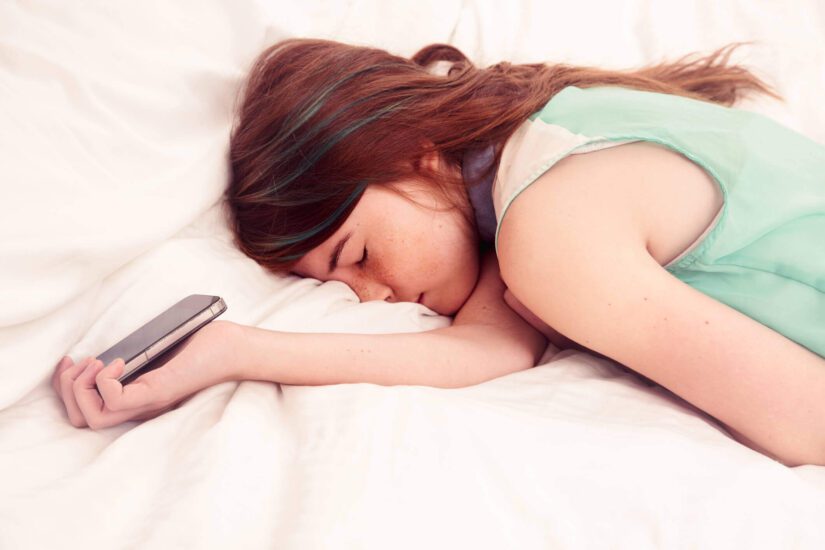The effects of sleep deprivation for teen students include:
- poor academic performance
- lower grade point averages
- mental health issues
- behavioral issues
- increased vulnerability to illness
We all know that young children need sleep and routines which is why we give them bedtimes.
But, as teens get older, we tend to forget that their brains and bodies are still growing and that they need more sleep than adults.
When teens are not getting the sleep they need, we tend to see their school performance suffer, in addition to other areas of their life.
How Does Lack Of Sleep Affect Academic Performance?
Studies show that teenagers need 9-10 hours of sleep. Without proper sleep, memory and the ability to concentrate as well as higher cognitive functioning is severely affected.
This means that when your teen pulls an all-nighter to study for exams, they are setting themselves up for a poor academic performance on exam day.
A survey by the National Sleep Foundation found that 60% of high school students suffered from extreme daytime fatigue which caused them to regularly fall asleep in class.
They attributed this to the average of 6.5 hours of sleep that the students were getting. “Chronic sleep loss in children and adolescents is one of the most common – and easily fixable – public health issues in the U.S. today,” said pediatrician Judith Owens, MD who led the study.
Dr. Avi Sadeh, a lecturer at the University of Tel Aviv, conducted a study to find out just how much sleep deprivation affected academic performance: “A loss of one hour of sleep is equivalent to [the loss of] two years of cognitive maturation and development.”
What this means practically is that a sleepy eighth grader will perform academically closer to a sixth grade level.
Lack of sleep also reduces the efficacy of immune systems and that leaves students vulnerable to all the illnesses they are exposed to at school. Missed school days also contribute to poor academic performances.
Common Reasons Teens Experience Sleep Deprivation
- Phase Delay – One of the reasons teens tend to stay up late is biological. Sleep researchers Mary Carskadon at Brown University, and Bill Dement at Stanford found that at certain times of our life, our biological clocks keep us up and make us resistant to sleep. This phenomenon is called ‘phase delay’ and occurs before and during puberty. That means that your poor teen doesn’t feel in the least bit sleepy despite the fact that they really need their rest.
- Screens – according to a one study by VicHealth, using a smartphone, computer or other handheld gaming device right before bedtime can reduce sleep time or cause sleep procrastination.
- Too Full After-School Schedule – Many teens are involved extracurricular activities such as sports, drama and band which can have late practices that can cut into homework and sleep time. Other teens take on part-time jobs or other social committments that can impact sleep times.
Ways to Help Teens Get Enough Sleep
- Melatonin Supplelements – One way to encourage students to sleep is by taking a melatonin supplement just before bed.
- Healthy Diet & Exercise – Encourage exercise and healthy eating. Avoid sugar and caffiene in the afternoon.
- Electronics Curfew – Get your teens to avoid computers, games and academic tasks at least two hours before bedtime.
These simple solutions can make a big impact on academic performance by increasing the number of hours of sleep your teen gets each night.
In addition, many schools across the U.S. have chosen to begin class with later start times so that students can sleep more.
Dr. Owens from the National Sleep Foundation had this to say about the change:
“By advocating for later school start times for middle and high school students, the AAP is both promoting the compelling scientific evidence that supports school start time delay as an important public health measure, and providing support and encouragement to those school districts around the country contemplating that change.”
A Harvard study discovered that the brain continues to learn even after you fall asleep.
This is when it consolidates information and works through processes or steps you have learned the day before.
Have you ever found that you were struggling with something, but then after a nap or a good night’s sleep, you suddenly got the hang of it?
That’s because while you are sleeping, your brain was working on the problem without the noise and distractions of the day.
Improve Your Teen’s Academic Performance By Helping Them Get The Sleep They Need
If you want to help your student to excel academically and be healthier and happier, then more sleep is definitely the answer. Move your Zzzzz to A’s this semester by making sure your students are getting all the sleep they need.
If your child could use some extra tutoring help with their schoolwork, find your nearby Tutor Doctor location today. We help students from all walks of life exceed in school and reach their academic goals.


